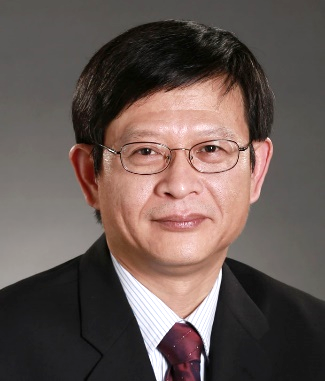
Guangwei Wei
Professor of Shandong University,
"Taishan Scholar" Distinguished Professor,
P.I. of “Targeted Intervention and Protein Modification of Cancer”
Education
1987 B.S. in Clinical Medicine, Taishan Medical College, China
2000 Ph.D., Shanghai Medical College, Fudan University, China
Principal Positions Held
2009-Present Professor, Cheeloo College of Medicine Shandong University, China
2011-Present Guest Scientist, LBNL, USA
2011-2014 Visiting professor, UCSF, USA
2002-2010 Postdoctoral Research Fellow, Assistant Scientist, Specialist, UCSF, USA
2000-2002 Postdoctoral Research Fellow, National Research Council, USA
1987-2000 Teaching Assistant and Lecturer, Taishan Medical College, China
Research Areas
1. Oncogenes and tumor suppressor genes in cancer development and progression 2. Cancer stem cells and their clinical significance
3. Biomarkers and targets for tumor recurrence, metastasis and treatment
4. Proteomics and protein modification in cancer
Teaching
Undergraduates: Cell Biology, Experiments of Cell Biology
Graduate students: Progress in Cell Biology, Introduction to Biomedicine
Foreign students: Cell Dysfunction and Disease
Research Grants
1. CUL4A promotes breast carcinogenesis through inhibiting the repair of DNA double-strand breaks, National Natural Science Foundation of China, PI, 2019-2022
2. Malignant transformation of breast epithelial cells induced by DCAF2-inhibited NHEJ mechanism, Natural Science Foundation of Shandong Province, PI, 2019-2021
3. A novel molecular characterization and mechanism of pancreatic cancer metastasis, National Key Research and Development Project, 2017-2020
4. Distinct interactions among FBXW7 and EBP1 isoforms regulate the development and progression of triple negative breast cancer, National Natural Science Foundation of China, PI, 2015-2018
5. Funds for "Taishan Scholar" professorships in Shandong province, PI, 2013-2018
6. WDR5 mediated epigenetic modification of CUL4A on breast and breast cancer stem cells,National Natural Science Foundation of China, PI, 2013-2016
7. TAP-MS based analysis of C2ORF40 in breast cancer, National Natural Science Foundation of China, PI, 2012-2015
8. Candidate tumor suppressor C2ORF40 suppresses the proliferation and mitosis of breast cancer cells, Doctoral program foundation of the Ministry of Education, PI, 2012-2014
9. Epigenetic modification in CUL4A-induced EMT and cancer stem cell formation,Natural Science Foundation of Shandong Province, PI, 2012-2014
Selected Peer-reviewed Research Articles
1. Liu X, Bi L, Wang Q, Wen M, Li C, Ren Y, Jiao Q, Mao JH, Wang C,Wei G*, Wang Y*. miR-1204 targets VDR to promote epithelial-mesenchymal transition and metastasis in breast cancer.Oncogene. 2018, 37(25):3426-3439.
2. Wang Y, Zhang P, Wang Y, Zhan P, Liu C, Mao JH*,Wei G*. Distinct interactions of EBP1 isoforms with FBXW7 elicits different functions in cancer.Cancer Res. 2017, 77(8):1983-1996.
3. Wang Y, Wen M, Kwon Y, Xu Y, Liu Y, Zhang P, He X, Wang Q, Huang Y, Jen KY, Labarge MA, You L, Kogan SC, Gray JW, Mao JH*,Wei G*.CUL4A Induces Epithelial-Mesenchymal Transition and Promotes Cancer Metastasis by Regulating ZEB1 Expression.Cancer Res. 2014, 74(2):520-31(ESI Top 1% citation).
4. Wang Y, Zhang P, Liu Z, Wang Q, Wen M, Wang Y, Yuan H, Mao JH,Wei G*. CUL4A overexpression enhances lung tumor growth and sensitizes lung cancer cells to Erlotinib via transcriptional regulation of EGFR.Mol Cancer, 2014, 13(1):252.
5. Sun Y, Wang Y, Fan C, Gao P, Wang X*,Wei G*, Wei J*. Estrogen promotes stemness and invasiveness of ER-positive breast cancer cells through Gli1 activation.Mol Cancer, 2014, 13(137).
6. Lu J, Wen M, Huang Y, He X, Wang Y, Wu Q, Li Z, Castellanos-Martin A, Abad M, Cruz-Hernandez JJ, Rodriguez CA, Pérez-Losada J, Mao JH*,Wei G*. C2ORF40 suppresses breast cancer cell proliferation and invasion through modulating expression of M phase cell cycle genes.Epigenetics, 2013, 8(6):571-83.
7. Jones L*,Wei G*, Sevcikova S, Phan V, Jain S, Shieh A, Wong JC, Li M, Dubansky J, Maunakea ML, Ochoa R, Zhu G, Tennant TR, Shannon KM, Lowe SW, Le Beau MM, Kogan SC*. Gain of MYC underlies recurrent trisomy of the MYC chromosome in acute promyelocytic leukemia.Journal of Experimental Medicine.2010, 207(12):2581-94.
8.Wei G*,Ku S, Ma GK, Saito S, Tang AA, Zhang J, Mao JH, Appella E, Balmain A, Huang EJ*.HIPK2 represses beta-catenin-mediated transcription, epidermal stem cell expansion, and skin tumorigenesis.Proc Natl Acad Sci U S A.2007, 104:32:13040-13045.
9. Wiggins AK*,Wei G*,Doxakis E, Wong C, Tang AA, Zang K, Luo EJ, Neve RL, Reichardt LF, Huang EJ*.Interaction of Brn3a and HIPK2 mediates transcriptional repression of sensory neuron survival.Journal of Cell Biology. 2004, 167(2):257-267.
Academic Services
Executive director, Chinese Society of Microcirculation
Chair, Oncology Committee, Chinese Society of Microcirculation
Executive director, Society of Cell Biology, Shandong Province
Contact Information
School of Basic Medical Science, Shandong University
44 Wenhuaxi Road
Jinan, Shandong Province, China
Tel: (531) 8838 2308
Email: gwwei@yahoo.com






